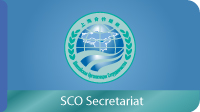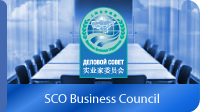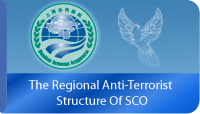|
|
 |
| Rashid Alimov: Leaders of SCO member states in Astana once again called on the world to join efforts in countering today’s challenges and threats |
| 12.06.2017 11:21 |
|
|
|
|
Following the the results of the Shanghai Cooperation Organisation Heads of State Council Meeting, which was held on June 8-9 in Astana, SCO Secretary-General Rashid Alimov gave an interview to the correspondent of the "Renminwang". Below is the text of the interview.
"Renminwang": The Astana Declaration was adopted following the SCO Heads of State Council Meeting on 9 June 2017. Has the overall vision of the situation in the region by the SCO member states changed over the last 12 months?
Rashid Alimov: The annual meeting of the SCO Heads of State Council (HSC) is the pinnacle of the year for the Organisation in all aspects of its multi-faceted cooperation. This meeting is prepared well in advance with input from all ministerial and expert platforms within the Organisation. You were right to call the Declaration of Heads of SCO Member States the main outcome document of the meeting, since it sums up the results of the joint efforts by SCO member states during the last year and outlines future development trends. By adopting the declaration, leaders get an opportunity to adjust cooperation mechanisms in order to improve the multi-faceted interaction within the SCO. Another important feature is that the declarations of SCO heads of state always feature the agreed assessment of the international situation and its future development, touching upon the key issues on the regional and global agendas.
The Astana Declaration is no exception. Moreover, the declaration adopted in Astana is a historical document, for a number of reasons. Primarily, it reflects the commitment of the SCO founding members to expand membership. For the first time, the SCO is accepting two new members into its fold, India and Pakistan, who have been actively involved in SCO undertakings for the last 12 years as observers. This exemplifies the SCO's commitment to the principle of openness, enshrined in its founding document, the Charter, 15 years ago.
In terms of its structure, the Astana Declaration follows the established traditions. It starts with an overview of a broad range of global issues with an emphasis on UN affairs and its development, calls for consolidating its role as the main international platform for resolving international issues, and reaffirms the importance of strictly abiding by the purposes and principles of the UN Charter.
This section is followed by a second block of no less importance on security and stability, counter-terrorism efforts, fighting separatism and extremism, illicit trafficking of narcotic drugs, psychotropic substances and their precursors, and cross-border organised crime. These issues remain central for the SCO as it strives to create the necessary conditions for harmonious development of the nations across the SCO space.
The Astana Declaration also outlines the agreed approaches of the SCO member states to tackling international issues, whereby the leaders of SCO member states stress that there is no alternative to resolving conflict situations across the world by political and diplomatic means based on strict compliance with the generally accepted norms and principles of international law.
Economic development and the need to step up economic and trade cooperation are also high on the agenda in the main outcome document of the SCO Summit in Astana. Broad international cooperation can drive global economic recovery and ensure economic and financial stability, as well as sustainable, vibrant, balanced and inclusive growth against the backdrop of an increasingly globalised economy.
It is important to note that the Astana Declaration reflects the shared vision by the SCO member states regarding the development of global trade, which should be based on the principles of transparency and non-discrimination and common rules for all actors. In this regard, the Declaration highlights protectionism-related risks, stresses the importance of countering any manifestations of protectionism, and emphasises, among other things, the need to remove existing trade barriers and prevent new ones from emerging.
As usual, the cultural and humanitarian dimension is also essential for the SCO, since the Organisation has already achieved substantial progress in a number of related areas. The Declaration takes note of the advances along this track in 2016 and 2017, and reaffirms the commitment to developing cultural ties within the Organisation. These efforts will include holding international exhibitions, festivals and contests that involve performance groups and individual artists as part of various SCO events, exploring archives and libraries to find historical documents, stepping up cultural exchanges and cooperation, as well as studying and perpetuating the region's cultural and natural heritage.
Overall, it has to be emphasised that the Astana Declaration is a comprehensive, inclusive document that outlines the key areas of cooperation for the SCO, in keeping with the SCO Development Strategy towards 2025. The Declaration turns a page in the history of the SCO, as it expands its membership from six to eight members.
"Renminwang": Starting 9 June 2017, the SCO will unite eight member states. How did leaders of the SCO founding states view the expansion of the Organisation and the inclusion of India and Pakistan as full members?
Rashid Alimov: Granting India and Pakistan full membership in the Organisation was the most important issue on the Summit's agenda, also because the SCO has expanded for the first time since its establishment. Heads of the founding states unanimously emphasised the historical importance of the two states' acceptance as full members. In this regard, I would like to note that the entry of India and Pakistan to the SCO was preceded by a rather long preparatory stage that was completed by these countries executing the 2016 Memorandum of Obligations in order to obtain the status of an SCO member state. In other words, a legal procedure was required for India's and Pakistan's unconditional accession to all the current SCO documents. Based on these premises, the heads of the member states, by their resolutions, granted India and Pakistan membership in the Organisation. I believe that this indicates a high level of development of India's and Pakistan's relations with all the SCO member states as well as a general understanding of the fact that the inclusion of such important regional players as India and Pakistan in the SCO will facilitate further development of multidimensional cooperation within the Organisation.
"Renminwang": Does the SCO plan to continue expanding? Can we expect other countries to join the SCO soon?
Rashid Alimov: The response to your question can be found in the Organisation's main strategic document, the SCO Charter. As a side note, on 7 June we marked the 15th anniversary of the adoption of this essential document. Well, the SCO's principle of openness is set out in the Charter. Therefore, decisions on accepting new members always remain on the agenda, on the table so to say, and may be taken provided that the candidate conforms and commits to the goals and principles of the SCO Charter, provisions of other international agreements and documents adopted within the SCO. At the Astana Summit, leaders recognised the importance of expanding the SCO and thus confirmed their commitment to the principle of openness.
Also I would like to point out that the SCO is not limited to its member states. Our family includes four observer states (Afghanistan, Belarus, Iran and Mongolia) and six dialogue partners (Azerbaijan, Armenia, Cambodia, Nepal, Turkey and Sri Lanka). These countries share views, goals and values with the SCO. This is why in the Astana Declaration, the leaders stressed the importance of further expanding the Organisation's cooperation with the observer states and dialogue partners in order to develop and improve its potential.
"Renminwang": We are witnessing international stability and security face a lot of pressure and trials. What efficient mechanisms does the SCO offer to maintain them?
Rashid Alimov: Ensuring security and stability have been and will remain among the Organisation's priorities. It should be recognised that the SCO is successfully solving these issues in the area of its competence. This is due to high trust between the member states and efficient mechanisms of cooperation in this essential aspect of the SCO's activity. This is why the Organisation has become an essential component of the modern architecture of international relations and a effective factor in maintaining regional security and global stability.
Specifically in the global dimension, the SCO supports uniting efforts of the entire global community to fight modern challenges and threats. In this regard, we have stressed the importance of strengthening the key role of the UN Security Council. The UN Security Council is the leading body bearing the main responsibility for international peace and security. At the same time, the SCO member states are consistent in their stance on the reform of the UN Security Council. The reform must entail largely expanded consultations in order to find a package solution without setting artificial timeframes and forcing options that did not receive wide support of UN members.
It is also important to note that in the Astana Declaration, the leaders reaffirmed their commitment to cooperation on disarmament and arms control, the peaceful use of nuclear energy as well as political and diplomatic resolution of regional challenges to non-proliferation. In this context, the SCO is consistently speaking in favour of strict compliance with the Non-Proliferation Treaty and the soonest commencement of the protocol on security guarantees to the Nuclear-Weapon-Free-Zone Treaty in Central Asia for all signatory states.
Due to the fact that unilateral and unlimited buildup of anti-ballistic missile systems by a state or a group of states with no consideration for other countries' interests damages international and regional security and stability, the SCO member states note that it is unacceptable to ensure one's own security at the expense of others'. It is also important to support practical measures to prevent an arms race in outer space, and to support the regimes stipulated by the Chemical Weapons Convention and the Biological and Toxin Weapons Convention.
"Renminwang": At its first summit in Shanghai in 2001, the SCO approved the Convention and declared that it intended to fight the "three evils." How consistent is the SCO in its efforts to jointly fight terrorism, extremism and separatism?
Rashid Alimov: The call to pool efforts against modern challenges and threats is more important today than it was 16 years ago. Terrorism, extremism and separatism are still the most serious threats to the life and health of people all over the world. It is for this reason that an uncompromising fight against these phenomena remains the most important area of the SCO's activities. This is reflected in the Astana Declaration. The SCO will promote dialogue and cooperation in ensuring comprehensive security, primarily in the fight against terrorism, including cyberterrorism, separatism, extremism, cross-border organised crime and drug trafficking. The SCO also plans to strengthen international information security and respond to emergencies.
In this context, we should note the importance of the SCO Convention on Combating Extremism that was approved by the Summit. This document will bolster international legislation on combating new challenges and threats. An upsurge of extremist crimes in the world has set the crucial task of opposing this phenomenon before the world community. The SCO Convention on Combating Extremism is the first specialised document promoting regional cooperation in the joint fight against extremism.
"Renminwang": Journalists and experts often criticise economic and trade cooperation rates. How do the SCO member states see regional economic cooperation?
Rashid Alimov: Constructive criticism is always useful. But we should recognise another thing too: there are no economic miracles; it takes painstaking work to ensure any step forward within an association. I can state just one thing: the SCO's economic track remains one of the factors of its progressive development. Moreover, I believe that its significance continues to grow. Let me remind you that the SCO Charter provides for creating favourable conditions to phase in the free movement of goods, capital, services and technologies. This is the most important point that is moving further to the forefront of the SCO's economic activities.
The Astana Declaration defines the effort to build a system of regional trade and economic cooperation; adopt additional measures to develop trade, promote investment activities, improve infrastructure, and establish, given the appropriate conditions, industrial parks; and improve living standards as the main areas in joint work at the present stage.
In practice, we will have to focus on promoting multilateral cooperation in the transport sphere; expanding the region's transport capabilities, including by building new and modernising existing sections of international transport routes; developing railway transport, including high-speed railways; creating multimode logistic centres; introducing advanced and innovative technologies; and implementing joint infrastructure projects.
I would like to stress in particular that the Astana Declaration emphasises the importance of the SCO Agreement on Facilitation of International Road Transport that came into force on 20 January 2017. The importance of this document can hardly be overestimated, primarily because it goes far beyond SCO transport cooperation. For example, it has much influence on prospects for promoting and expanding the entire system of trade and economic cooperation in Eurasia and on attracting investment in related infrastructure projects. The SCO is also working on its Road Development Programme. The member states believe that, once approved, it will be of much importance for a coordinated development of road networks, improvement of transport accessibility and connectivity, and optimisation of transport links between all production and consumption zones in the SCO countries. Therefore, SCO economic cooperation will continue to progress with account taken of the latest targets and priorities formulated by the SCO heads of state in the Astana Declaration.
"Renminwang": Can we say that in Astana the SCO heads of state have outlined a new course for the Organisation's further development?
Rashid Alimov: The SCO Development Strategy towards 2025 has become the basic document defining the Organisation's further development over the next 10 years. The Action Plan for 2016-2020 formulates concrete steps for its stage-by-stage implementation. The member states are guided by these documents in promoting practical cooperation within the SCO. At the same time, declarations adopted by the SCO Heads of State Council, its supreme body, as a result of its annual meetings make it possible not only to take stock of joint activities over the previous year but also to readjust the mechanisms of multilateral cooperation in tune with the changing situation. The Astana Declaration has upgraded the key areas of SCO activities, including in the light of the current state of affairs and latest political, security, economic and humanitarian trends in the region and the world as a whole.
Possibly, the fundamental point is that the Astana Declaration reaffirms the SCO's invariable commitment to peace, co-development, and equitable cooperation, as well as to expanding dialogue and interaction with the international community. There is no doubt that the eight member states, united by the Shanghai spirit, will make every effort, within the SCO, to strengthen security and stability and promote their trade, economic, cultural and humanitarian ties.
|
|
* Реестр иностранных средств массовой информации, выполняющих функции иностранного агента:
Голос Америки, Idel.Реалии, Кавказ.Реалии, Крым.Реалии, Телеканал Настоящее Время, Azatliq Radiosi, PCE/PC, Сибирь.Реалии, Фактограф, Север.Реалии, Радио Свобода, MEDIUM-ORIENT, Пономарев Лев Александрович, Савицкая Людмила Алексеевна, Маркелов Сергей Евгеньевич, Камалягин Денис Николаевич, Апахончич Дарья Александровна, Medusa Project, Первое антикоррупционное СМИ, VTimes.io, Баданин Роман Сергеевич, Гликин Максим Александрович, Маняхин Петр Борисович, Ярош Юлия Петровна, Чуракова Ольга Владимировна, Железнова Мария Михайловна, Лукьянова Юлия Сергеевна, Маетная Елизавета Витальевна, The Insider SIA, Рубин Михаил Аркадьевич, Гройсман Софья Романовна, Рождественский Илья Дмитриевич, Апухтина Юлия Владимировна, Постернак Алексей Евгеньевич, Общество с ограниченной ответственностью Телеканал Дождь, Петров Степан Юрьевич, Istories fonds, Шмагун Олеся Валентиновна, Мароховская Алеся Алексеевна, Долинина Ирина Николаевна, Шлейнов Роман Юрьевич, Анин Роман Александрович, Великовский Дмитрий Александрович, Альтаир 2021, Ромашки монолит, Главный редактор 2021, Вега 2021
* Сведения реестра НКО, выполняющих функции иностранного агента:
Фонд защиты прав граждан Штаб, Институт права и публичной политики, Лаборатория социальных наук, Фонд по борьбе с коррупцией, Альянс врачей, НАСИЛИЮ.НЕТ, Мы против СПИДа, Фонд защиты прав граждан, СВЕЧА, Гуманитарное действие, Открытый Петербург, Феникс ПЛЮС, Лига Избирателей, Правовая инициатива, Гражданская инициатива против экологической преступности, Фонд борьбы с коррупцией, Гражданский Союз, Российский Красный Крест, Центр Хасдей Ерушалаим, Центр поддержки и содействия развитию средств массовой информации, Горячая Линия, В защиту прав заключенных, Институт глобализации и социальных движений, Центр социально-информационных инициатив Действие, ВМЕСТЕ, Благотворительный фонд охраны здоровья и защиты прав граждан, Благотворительный фонд помощи осужденным и их семьям, Фонд Тольятти, Новое время, Серебряная тайга, Так-Так-Так, центр Сова, центр Анна, Проект Апрель, Самарская губерния, Эра здоровья, правозащитное общество Мемориал, Аналитический Центр Юрия Левады, Издательство Парк Гагарина, Фонд имени Андрея Рылькова, Сфера, Центр защиты СИБАЛЬТ, Уральская правозащитная группа, Женщины Евразии, Рязанский Мемориал, Екатеринбургское общество МЕМОРИАЛ, Институт прав человека, Фонд защиты гласности, Российский исследовательский центр по правам человека, Дальневосточный центр развития гражданских инициатив и социального партнерства, Пермский региональный правозащитный центр, Гражданское действие, Центр независимых социологических исследований, Сутяжник, АКАДЕМИЯ ПО ПРАВАМ ЧЕЛОВЕКА, Частное учреждение Совета Министров северных стран, Центр развития некоммерческих организаций, Гражданское содействие, Центр Трансперенси Интернешнл-Р, Центр Защиты Прав Средств Массовой Информации, Институт развития прессы - Сибирь, Фонд поддержки свободы прессы, Гражданский контроль, Человек и Закон, Общественная комиссия по сохранению наследия академика Сахарова, Информационное агентство МЕМО. РУ, Институт региональной прессы, Институт Развития Свободы Информации, Экозащита!-Женсовет, Общественный вердикт, Евразийская антимонопольная ассоциация, Чанышева Лилия Айратовна, Сидорович Ольга Борисовна, Таранова Юлия Николаевна, Туровский Александр Алексеевич, Васильева Анастасия Евгеньевна, Ривина Анна Валерьевна, Бурдина Юлия Владимировна, Бойко Анатолий Николаевич, Гусева Ольга Андреевна, Дугин Сергей Георгиевич, Пивоваров Андрей Сергеевич, Писемский Евгений Александрович, Аверин Виталий Евгеньевич, Барахоев Магомед Бекханович, Шевченко Дмитрий Александрович, Жданов Иван Юрьевич, Рубанов Роман Викторович, Шарипков Олег Викторович, Мальсагов Муса Асланович, Мошель Ирина Ароновна, Шведов Григорий Сергеевич, Пономарев Лев Александрович, Каргалицкий Борис Юльевич, Созаев Валерий Валерьевич, Исакова Ирина Александровна, Исламов Тимур Рифгатович, Романова Ольга Евгеньевна, Щаров Сергей Алексадрович, Цирульников Борис Альбертович, Халидова Марина Владимировна, Людевиг Марина Зариевна, Федотова Галина Анатольевна, Паутов Юрий Анатольевич, Верховский Александр Маркович, Пислакова-Паркер Марина Петровна, Кочеткова Татьяна Владимировна, Чуркина Наталья Валерьевна, Акимова Татьяна Николаевна, Золотарева Екатерина Александровна, Рачинский Ян Збигневич, Жемкова Елена Борисовна, Гудков Лев Дмитриевич, Илларионова Юлия Юрьевна, Саранг Анна Васильевна, Захарова Светлана Сергеевна, Аверин Владимир Анатольевич, Щур Татьяна Михайловна, Щур Николай Алексеевич, Блинушов Андрей Юрьевич, Мосин Алексей Геннадьевич, Гефтер Валентин Михайлович, Симонов Алексей Кириллович, Флиге Ирина Анатольевна, Мельникова Валентина Дмитриевна, Вититинова Елена Владимировна, Баженова Светлана Куприяновна, Исаев Сергей Владимирович, Максимов Сергей Владимирович, Беляев Сергей Иванович, Голубева Елена Николаевна, Ганнушкина Светлана Алексеевна, Закс Елена Владимировна, Буртина Елена Юрьевна, Гендель Людмила Залмановна, Кокорина Екатерина Алексеевна, Шуманов Илья Вячеславович, Арапова Галина Юрьевна, Пастухова Анна Яковлевна, Прохоров Вадим Юрьевич, Шахова Елена Владимировна, Подузов Сергей Васильевич, Протасова Ирина Вячеславовна, Литинский Леонид Борисович, Лукашевский Сергей Маркович, Бахмин Вячеслав Иванович, Шабад Анатолий Ефимович, Сухих Дарья Николаевна, Орлов Олег Петрович, Добровольская Анна Дмитриевна, Королева Александра Евгеньевна, Смирнов Владимир Александрович, Вицин Сергей Ефимович, Золотухин Борис Андреевич, Левинсон Лев Семенович, Локшина Татьяна Иосифовна, Орлов Олег Петрович, Полякова Мара Федоровна, Резник Генри Маркович, Захаров Герман Константинович
* Единый федеральный список организаций, в том числе иностранных и международных организаций, признанных в соответствии с законодательством Российской Федерации террористическими:
Высший военный Маджлисуль Шура, Конгресс народов Ичкерии и Дагестана, Аль-Каида, Асбат аль-Ансар, Священная война, Исламская группа, Братья-мусульмане, Партия исламского освобождения, Лашкар-И-Тайба, Исламская группа, Движение Талибан, Исламская партия Туркестана, Общество социальных реформ, Общество возрождения исламского наследия, Дом двух святых, Джунд аш-Шам, Исламский джихад, Аль-Каида, Имарат Кавказ, АБТО, Правый сектор, Исламское государство, Джабха аль-Нусра ли-Ахль аш-Шам, Народное ополчение имени К. Минина и Д. Пожарского, Аджр от Аллаха Субхану уа Тагьаля SHAM, АУМ Синрике, Муджахеды джамаата Ат-Тавхида Валь-Джихад, Чистопольский Джамаат, Рохнамо ба суи давлати исломи, Террористическое сообщество Сеть, Катиба Таухид валь-Джихад, Хайят Тахрир аш-Шам, Ахлю Сунна Валь Джамаа
* Перечень общественных объединений и религиозных организаций в отношении которых судом принято вступившее в законную силу решение о ликвидации или запрете деятельности:
Национал-большевистская партия, ВЕК РА, Рада земли Кубанской Духовно Родовой Державы Русь, Асгардская Славянская Община Асгардской Веси Беловодья, Славянская Община Капища Веды Перуна, Мужская Духовная Семинария Староверов-Инглингов, Нурджулар, К Богодержавию, Таблиги Джамаат, Русское национальное единство, Национал-социалистическое общество, Джамаат мувахидов, Объединенный Вилайат Кабарды, Балкарии и Карачая, Союз славян, Ат-Такфир Валь-Хиджра, Пит Буль, Национал-социалистическая рабочая партия России, Славянский союз, Формат-18, Благородный Орден Дьявола, Армия воли народа, Национальная Социалистическая Инициатива города Череповца, Духовно-Родовая Держава Русь, Русское национальное единство, Древнерусской Инглистической церкви Православных Староверов-Инглингов, Русский общенациональный союз, Движение против нелегальной иммиграции, Кровь и Честь, О свободе совести и о религиозных объединениях, Омская организация Русское национальное единство, Северное Братство, Клуб Болельщиков Футбольного Клуба Динамо, Файзрахманисты, Мусульманская религиозная организация п. Боровский, Община Коренного Русского народа Щелковского района, Правый сектор, Украинская национальная ассамблея, Украинская повстанческая армия, Тризуб им. Степана Бандеры, Украинская организация «Братство», Свидетели Иеговы, О противодействии экстремистской деятельности, РЕВТАТПОД, Артподготовка, Штольц, В честь иконы Божией Матери Державная, Сектор 16, Независимость, Организация футбольных болельщиков «Фирма», Молодежная правозащитная группа МПГ, Курсом Правды и Единения, Каракольская инициативная группа, Автоград Крю, Союз Славянских Сил Руси, Алля-Аят, Благотворительный пансионат Ак Умут, Русская республика Русь, Арестантское уголовное единство, Башкорт, Нация и свобода, W.H.С., Фалунь Дафа, Иртыш Ultras, Русский Патриотический клуб-Новокузнецк/РПК, Сибирский державный союз, Фонд борьбы с коррупцией, Фонд защиты прав граждан, Штабы Навального
|






















Leave a comment